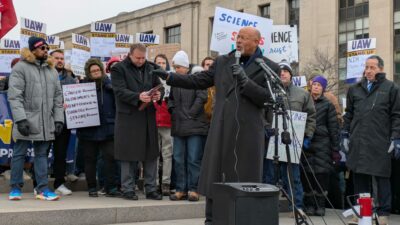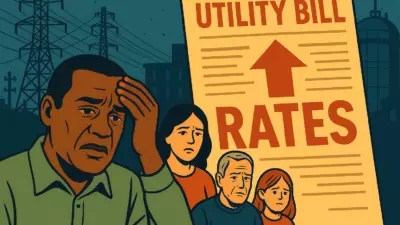Democrat Rep. Glenn Ivey is usually calm and mild-mannered, but he admitted to being “angry” after a weekend trip to El Salvador where officials refused to let him see a constituent who’s been detained in prison there since March on orders from the Trump administration.

“We crossed all the Ts, dotted all the Is. We get down there, they [El Salvador authorities] won’t open the gate,” Ivey said of his attempt to visit Kilmar Abrego Garcia, a migrant who was living in Beltstville when he was seized by federal officials and deported, despite a court order allowing him to stay here.
Ivey said he spoke with El Salvadoran authorities outside the prison through a small, sliding window in “95-degree heat” and was told he needed to get a permit back in San Salvador, which was about 90 minutes from the prison where Abrego Garcia is being held. This after Ivey met with the Salvadoran ambassador to the U.S. before heading there.
“If you talk with the ambassador, you shouldn’t need a permit,” Ivey said. “This is a congressional delegation coming to look at how you’re spending American tax dollars to jail people we deport. That’s ridiculous.”
Abrego Garcia, a native of El Salvador, was living in Prince George’s County with his wife, a U.S. citizen, and their child, while he worked as an apprentice sheet metal worker in a local union. He was driving home from Baltimore on March 12 with his son when he was stopped by U.S. Immigration and Customs Enforcement officers and held for being in the U.S. illegally.
Abrego Garcia has been shielded from deportation since 2019, when an immigration judge in a previous hearing determined that, if sent back to El Salvador, he had a credible fear of being harmed by the gangs there that caused him to leave the country in the first place.
ICE officials told Abrego Garcia his status had changed, even though they later admitted in court papers that it had not. Three days after he was stopped, he was sent to El Salvador on one of several planeloads of deportees who were ordered held in that country’s Centro de Confinamiento del Terrorismo, or CECOT, in exchange for millions in payments from the U.S.
Abrego Garcia has since been moved to a lower-security prison, but he remains held in El Salvador even though ICE and the Justice Department have adknowledged in separate court filings that his deportation was an “administrative error” under the 2019 court order.
But the Trump administration, up to and including President Donald Trump (R), insist Abrego Garcia is a member of the MS-13 gang, a charge Abrego Garcia and his supporters vigorously deny. They note that he has not faced criminal charges in the U.S.
His supporters have challenged the administration to bring Abrego Garcia back to face charges in court, but the White House has refused to do so. The deportion without a hearing violates his due process right, they argue, and courts have agreed, all the was up to the U.S. Supreme Court, which ordered the Trump administration in April to “facilitate” his return to the U.S.
Ivey said that the administration’s disregard of the law is pushing the country toward a “constitutional crisis, it looks like refusing to comply with court orders. That’s scary.”
ICE did not immediately respond to an email seeking comment.
Ivey was accompanied on his trip by Abel Nuñez, executive director of CARECEN, the Central American Resource Center, in Washington, D.C. Nuñez, who traveled to El Salvador to help schedule meetings with nonprofit organizations, accused the Trump administration of mimicking the Salvadoran government, by arresting people without justification. He said he was scheduled to meet over the weekend with an attorney who works with a human rights organization called Cristosal, but she was arrested on “trumped-up charges for a couple of days.”
“No one knew where she was,” Nuñez said. “This is what an authoritarian state does to create fear, sort of imposed to dominance on the people they are meant to be serving. We can think of El Salvador as a case study.”
Ivey summed up the trip in one word: bad.
“Kilmar’s wife had messages she asked me to convey to him. His lawyer had messages he wanted me to convey to him. I wasn’t able to do that,” Ivey said.
“Even in our supermax prisons here in the United States, you can talk to your lawyer,” he said. “It was just bad all the way around.”
YOU MAKE OUR WORK POSSIBLE. SUPPORT
Maryland Matters is part of States Newsroom, a nonprofit news network supported by grants and a coalition of donors as a 501c(3) public charity. Maryland Matters maintains editorial independence. Contact Editor Steve Crane for questions: [email protected].







